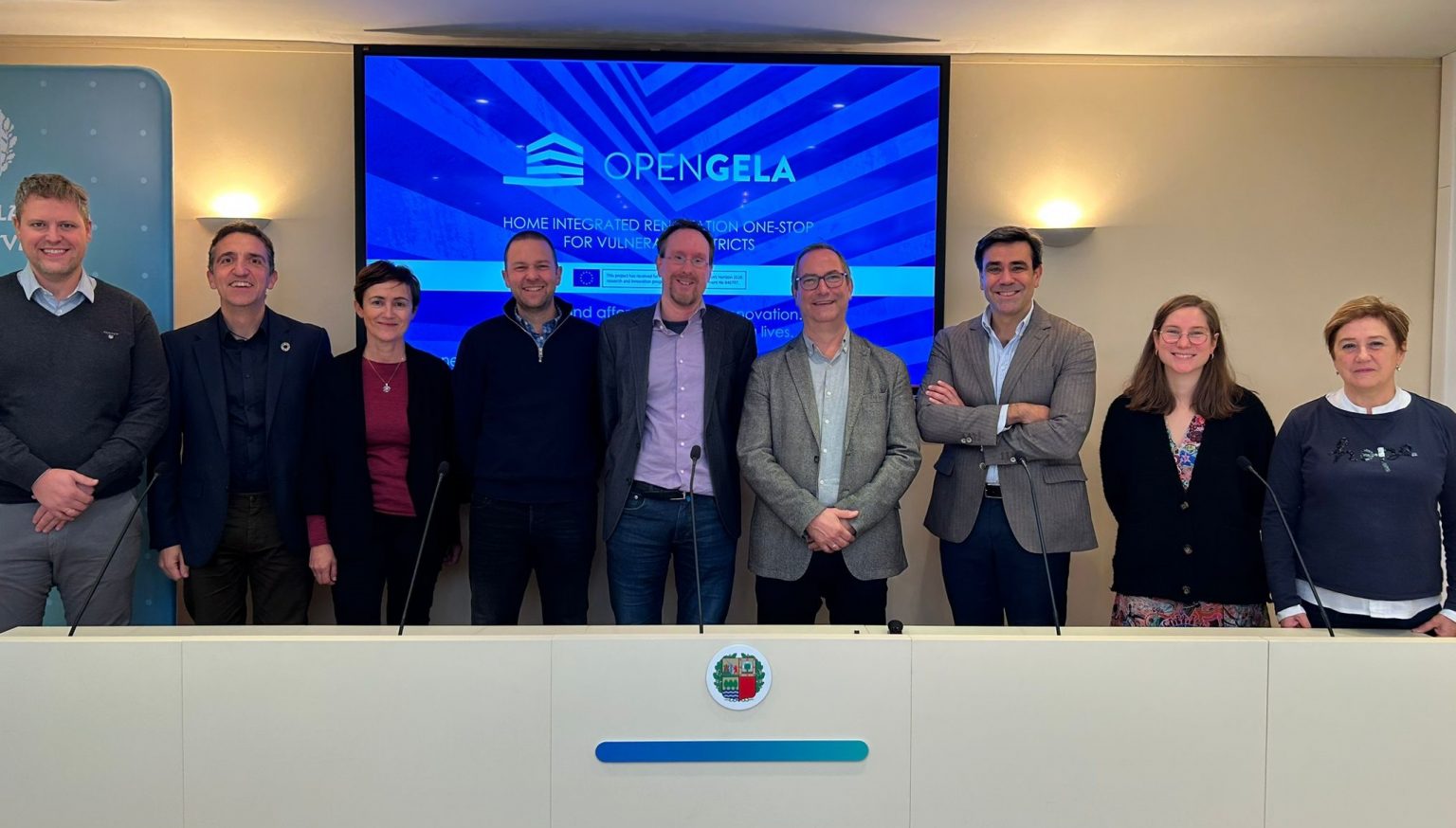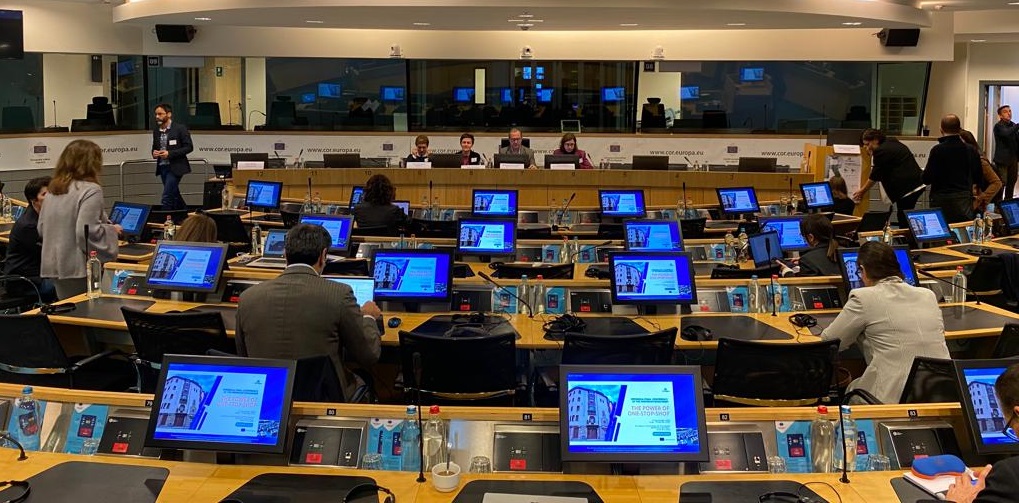The European Opengela project concludes with a new urban regeneration model that is already being applied in 10 neighbourhoods and will be extended to another 14

The Opengela delegation in Brussels together with Martin Eibl, Senior Project Advisor at CINEA.
- In three and a half years, it has set up neighbourhood offices in Otxarkoaga (Bilbao) and Txonta (Eibar) and in Durango, Lasarte, Pasaia, Abanto-Zierbena, Santurtzi, Valle de Trápaga, Orduña and Amurrio.
- The ‘opengelas’ of the two pilots accompany nearly 800 people in the refurbishment of their buildings. So far it has led to an average energy saving per dwelling of more than 60%, an investment in sustainable energy of 9.6 million euros, a saving in CO2 emissions of 758 t/year, as well as mobilising private investment of 3.2 million euros.
After three and a half years of work, the Opengela project concludes with its main objective fulfilled: to establish a new model of urban regeneration that is already being applied in 10 neighbourhoods in the Basque Country and which plans to be extended to another 14. The project, financed by the European Horizon 2020 programme, presented its main conclusions yesterday, 17 November, in Brussels, at an event held at the Committee of the Regions.
The conference entitled ‘The power of One-Stop-Shops’ was attended by the delegate of the Basque Government in Brussels, Marta Marín, as well as the director of Territorial Planning and Urban Agenda, Ignacio de la Puerta, who heads the project consortium. Txari Vallejo (Bilbao Municipal Housing) and Ibon Irazola (Debegesa) also took part to explain the development of the two pilot projects in the Otxarkoaga (Bilbao) and Txonta (Eibar) neighbourhoods.
The European Opengela project is coming to an end, having achieved the objectives proposed at its beginning and -above all- responding to one of the most important requirements that the European Commission asks of the projects it finances: to ensure their continuity over time with the creation of a solid and replicable model.
During the time the project has lasted, the neighbourhood offices of the two pilot projects have assisted a total of 780 people who, thanks to the support of technical and administrative staff, have started up renovation processes in their buildings, reaching a total of 469 dwellings. The renovation interventions have achieved clear improvements in the quality of life of the residents. On the one hand, actions have been carried out in the facilities to improve accessibility (installation of lifts, refurbishment of doorways), or the installation of fire safety systems. On the other hand, energy improvements have been made (façade insulation, installation of boilers, replacement of windows, etc.) which have had a direct impact on the substantial improvement in the quality and comfort conditions of the dwellings, identified by a significant improvement in indoor air quality.
These improvements translate into an investment in sustainable energy of 9.6 million euros, a saving in energy demand of more than 3.9 GWh/year, a reduction in CO2 emissions of 758 tCO2/year, as well as mobilising private investment of 3.2 million euros.
On the other hand, the project has facilitated funding through a specific system of the Opengela model, aimed primarily at serving people at risk of vulnerability. To this end, two-year credit lines have been created to finance public aid, financing has been facilitated for homeowners’ associations, and the age limit for access to financing has been extended to 70 years of age (the average age of the people assisted is over 58), among other measures.

A scalable and replicable project
As Ignacio de la Puerta explained, the experience gained with the Opengela project, in addition to improving the quality of life of residents, «has enabled the development of a new management model that can be extended to the rest of the Basque Country with the objectives of reducing the risk of energy poverty among citizens, creating zero energy balance and friendly neighbourhoods with universal accessibility in the building stock and in urban environments and that can become carbon sinks in a significant contribution to mitigating and adapting to the effects of climate change».
The success of this formula has led to its extension to other municipalities such as Lasarte (Basaundi Bailara) and Durango (Aramotz), as well as others such as Pasaia (Andonaegi), Abanto-Zierbena (Las Peñucas), Santurtzi (Aurora Vildósola), Valle de Trápaga (San Andrés neighbourhood), Orduña (in the Dolores Madaria and Landata neighbourhoods) and in Amurrio (Goikolarra).
In addition, there are another 14 neighbourhoods in the Basque Country that are in the early stages of implementation. In Alava, work will be carried out in the Zaramaga neighbourhood in Vitoria-Gasteiz, in Bizkaia in three neighbourhoods in Bilbao (Párroco Unzeta, Torre Urizar and Uretamendi), in Bermeo (Iparragirre and Txibitxiaga) and in Sestao (Vista Alegre); and in Gipuzkoa in Arrasate (Santa Teresa neighbourhood), San Sebastian (Altza), Eibar (Hijos de Gabilondo), Elgoibar (Sigma housing), Errenteria (Beraun), Leaburu (Txarama), Soraluze (Ezozia) and Irun.
At the European level, in addition to having shared experiences with many other «One-Stop-Shops» in France (Picardie-Pass and Île-de-France énergies), Ireland (Tipperary-SuperHomes), Italy (Sharing Cities – Milan) and Austria (RecoBooster – Vienna), it has also generated interest in other places to implement this model of urban regeneration. This is the case of two regions in Croatia (on the one hand, Medjimurje, and on the other, the counties of Varazdin, Koprivnica-Krizevci and Virovitica-Podravina), one in Poland (Mazovia), one in Greece (Thessaloniki), as well as Extremadura and Asturias, and an Irish entity implemented in three counties (Carlow, Kilkenny and Wexford). All of them have visited the pilot neighbourhoods of Opengela with the idea of replicating the model.
During the session, there was also space to listen to other cases of good practice, such as AGREE (a project also led by the Basque Government), ComAct (an urban regeneration project implemented in several Eastern European countries) and Renowatt (a project implemented in the Belgian region of Wallonia). In the second part of the day, Julien Dijol (from the European Association for Social Housing, Housing Europe, also a partner of Opengela) and Amélie Ancelle (from Energy-Cities, the European grouping of cities for sustainable energy) took part.
Example of public-private collaboration
The European Opengela project started in May 2019 and is an example of public-private collaboration. In addition to the Basque Government, there are other public entities in the consortium, such as the Basque Energy Agency (EVE), Bilbao Municipal Housing and Debegesa, as well as two European-level bodies (FEDARENE and Housing Europe) and firms specialising in financing (GNE Finance), communication (Gabineteseis) and European affairs (Zabala).
OPENGELA NEWSLETTER
Receive all news related to Opengela

Co-funded by the European Union. The views and opinions expressed are solely those of the authors and do not necessarily reflect those of the EU or CINEA. Neither the European Union nor the funding authority can be held responsible for them.



